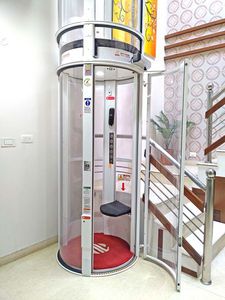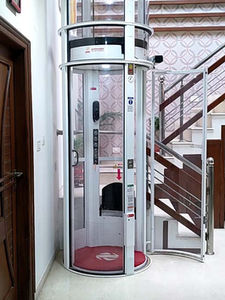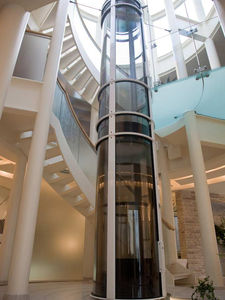Pneumatic Vacuum Elevators (PVE Lifts) for Home
Founded in 2002, in Miami, Florida, the Company proudly manufactures three versions of its vacuum elevators, ranging from single to a three-passenger, wheelchair-accessible model. Rather than using cables or pistons, PVE manufactures the only elevator that is powered by one of the most abundant resources in the world… AIR!
Due to its minimal footprint, rapid installation and a unique panoramic design, the vacuum elevators go where other elevators simply cannot. PVE maintains an expanding network of more than 160 authorized dealers with 7,000+ units installed worldwide.
PVE Europe is the European headquarters of Pneumatic Vacuum Elevators, LLC, the designer and manufacturer of pneumatic vacuum elevators based in Medley, FL, USA. We are an innovative, technology-based company that has revolutionized how people and goods may be vertically transported within residential, marine and stage environments.
Through the application of fundamental physics and the utilization of attractive materials, Pneumatic Vacuum Elevators has virtually created a transportation vehicle within a bubble. Many go as far as to say it is “A Work of Art”.

Easy, quick and clean installation
Due to its self-supporting structure, the elevator is capable of freestanding on any level ground surface. two to five stops for residential, marine, and stage applications. Installation within one to two days
Eco-friendly
The revolutionary technology of the vacuum elevator has changed the way people and goods are being transported vertically within their homes, and furthermore, has done so in an environmentally friendly manner.
Rather than using cables or pistons, the unique residential elevator is powered by one of the most abundant resources in the world: AIR

Pneumatic Vacuum Elevators - Models
PVE offers a variety of three vacuum elevator models: PVE 30, PVE 37, and PVE 52.
Pneumatic Vacuum Elevators - Operations

The only Elevator that Works with the Power of the Air
If you are thinking of installing an elevator in your home and you have read a bit about different types of lifts, you know that our technology is unique in the elevator industry.
Our vacuum elevators operate under the principles of pneumatics and vacuum, both different but related, which together result in pneumatic vacuum technology, which the gives name to our home lifts.
Pneumatic (Greek πνεῦμα “air”) is the technology that uses air as a mode of transmission of energy to move and function mechanisms, in our case the car of our vacuum elevators.
Vacuum (Latin vacīvus) is described as a closed cavity where air pressure or other gases are less than atmospheric pressure.
But … how are these two principles applied in our vacuum elevators?
The pneumatic vacuum elevator is formed by a cylindrical vertical shaft, and a car which moves inside.
For ascending operations, the vacuum system on the top of the elevator, draws air from above the seal of the car on the interior of the cylinder creating a low pressure area located above the cabin seal. At the same time, atmospheric pressure (greater than the low pressure system above the cabin seal) enters into the ground floor cylinder through holes/perforations on the ground floor cylinder panels, furthermore creating lift.
To descend, there is a valve inside the vacuum motor system that regulates the entry of air into the cylinder restoring pressure, lowering the car smoothly without consuming energy, also making the vacuum elevator an ecofriendly lift.

Pneumatic Vacuum Elevators - Configurations

Head Configuration
Head configuration in the vacuum system is located directly on top of the upper floor vertical cylinder of the pneumatic vacuum elevator.
The electrical control panel is inside, and the only installation requirements are to connect to a 230v outlet near the machinery.
This format is best in homes that have sufficient height on the top floor (Minimum height for installation 2700mm lift head tire format)

Split Unit Configuration
In the split unit configuration, the vacuum system is located in a split box that can be installed at a distance of 10 meters from the top of the vacuum elevator. The split system piping is connected to the top of the cylinder via two pipes of 110mm diameter PVC.
The electric control panel can be mounted externally as any electrical box (hanging on the wall, wardrobe …). There is also the possibility of placing a “false head” on which to locate the electrical box and the PVC pipes are connected.
Safety of the Pneumatic Vacuum Elevators
The pneumatic vacuum elevator is formed by a cylindrical vertical shaft, and a car which moves inside.
For ascending operations, the vacuum system on the top of the elevator, draws air from above the seal of the car on the interior of the cylinder creating a low pressure area located above the cabin seal. At the same time, atmospheric pressure (greater than the low pressure system above the cabin seal) enters into the ground floor cylinder through holes/perforations on the ground floor cylinder panels, furthermore creating lift.
To descend, there is a valve inside the vacuum motor system that regulates the entry of air into the cylinder restoring pressure, lowering the car smoothly without consuming energy, also making the vacuum elevator an ecofriendly lift.

What happens in the Event of a Vacuum loss?
Our air driven residential elevators have mechanical safety brakes which come into action only if an extreme circumstance arises as a result of the detection of loss of vacuum over the top seal.
These mechanical safety brakes are activated within the first 5 cm of free fall if vacuum loss is detected, and the cabin immediately anchors to the columns of the structure at that point.
If vacuum loss and safety brake engagement is to occur, there are a few simple methods of rescue, as in a traditional elevator.
With all of these security features, our elevator has been called “the world’s Safest Residential Elevator.“
Videos & Gallery































